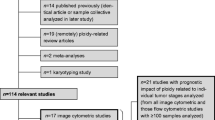Abstract
Flow cytometric DNA analysis was performed on the colonic adenomas of 24 patients who had resection of an invasive colorectal carcinoma subsequent to polypectomy. The incidence of DNA aneuploidy among these adenomas was only 13 percent. Thus, simple recognition of colonic adenomas as being DNA diploid or DNA aneuploid is unlikely to be helpful for identifying patients with adenoma who are at high risk for developing a future colorectal carcinoma.
Similar content being viewed by others
References
Armitage NC, Robins RA, Evans DF, Turner DR, Baldwin RW, Hardcastle JD. The influence of tumours cell DNA abnormalities on survival in colorectal cancer. Br J Surg 1985;72:828–30.
Quirke P, Fozard JB, Dixon MF, Dyson JE, Giles GR, Bird CC. DNA aneuploidy in colorectal adenomas. Br J Cancer 1986;53:477–81.
van den Ingh HF, Griffioen G, Cornelisse CJ. Flow cytometric detection of aneuploidy in colorectal adenomas. Cancer Res 1985;45:3392–7.
Hedley DW, Friedlander ML, Taylor IW, Rugg CA, Musgrove EA. Method for analysis of cellular DNA content of paraffin-embedded pathological material using flow cytometry. J Histochem Cytochem 1983;31:1333–5.
Vindeløv LL, Christensen, IJ, Nissen NI. A detergent-trypsin method for the preparation of nuclei for flow cytometric DNA analysis. Cytometry 1983;3:323–7.
Hiddemann W, Schumann J, Andreeff M, et al. Convention on nomenclature for DNA cytometry. Cytometry 1984;5:445–6.
Goh HS, Jass JR. DNA content and the adenoma-carcinoma sequence in the colorectum. J Clin Pathol 1986;39:387–92.
Morson B. President's address: the polyp-cancer sequence in the large bowel. Proc R Soc Med 1974;67:451–7.
Morson BC. The evolution of colorectal carcinoma. Clin Radiol 1984;35:425–31.
Lotfi AM, Spencer RJ, Ilstrup DM, Melton LJ III. Colorectal polyps and the risk of subsequent carcinoma. Mayo Clin Proc 1986;61:337–43.
Stewart J, Evan G, Watson J, Sikora K. Detection of the c-myc oncogene product in colonic polyps and carcinomas. Br J Cancer 1986;53:1–6.
Hendy-Ibbs P, Cox H, Evan GI, Watson JV. Flow cytometric quantitation of DNA and c-myc oncoprotein in archival biopsies of uterine cervix neoplasia. Br J Cancer 1987;55:275–82.
Author information
Authors and Affiliations
About this article
Cite this article
Scott, N.A., Weiland, L.H., Dozois, R.R. et al. DNA aneuploidy in solitary colonic adenomas and the future risk of colorectal cancer. Dis Colon Rectum 31, 423–426 (1988). https://doi.org/10.1007/BF02552609
Received:
Issue Date:
DOI: https://doi.org/10.1007/BF02552609




